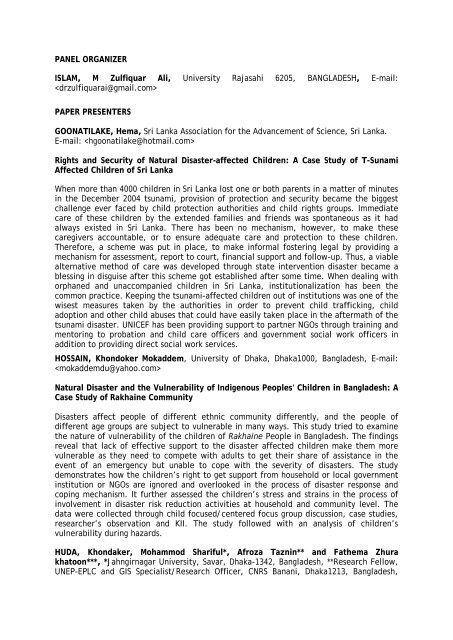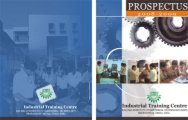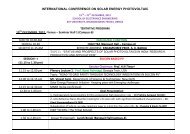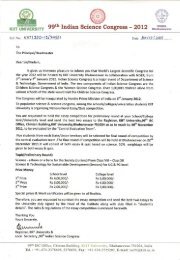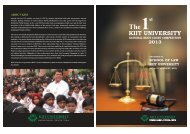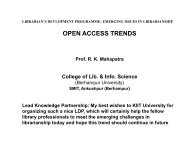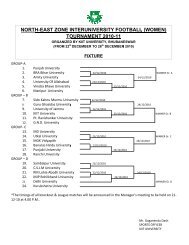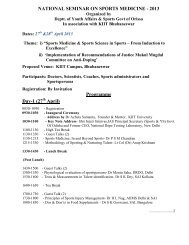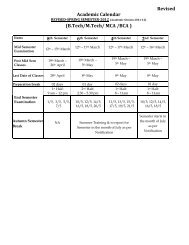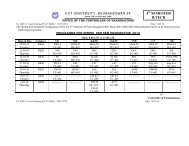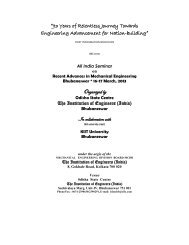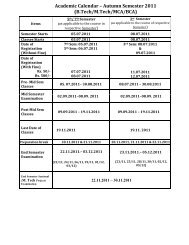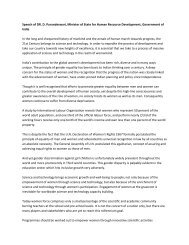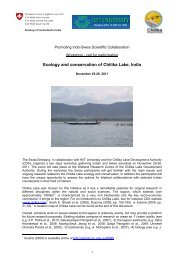PANEL ORGAN - KIIT University
PANEL ORGAN - KIIT University
PANEL ORGAN - KIIT University
Create successful ePaper yourself
Turn your PDF publications into a flip-book with our unique Google optimized e-Paper software.
<strong>PANEL</strong> <strong>ORGAN</strong>IZER<br />
ISLAM, M Zulfiquar Ali, <strong>University</strong> Rajasahi 6205, BANGLADESH, E-mail:<br />
<br />
PAPER PRESENTERS<br />
GOONATILAKE, Hema, Sri Lanka Association for the Advancement of Science, Sri Lanka.<br />
E-mail: <br />
Rights and Security of Natural Disaster-affected Children: A Case Study of T-Sunami<br />
Affected Children of Sri Lanka<br />
When more than 4000 children in Sri Lanka lost one or both parents in a matter of minutes<br />
in the December 2004 tsunami, provision of protection and security became the biggest<br />
challenge ever faced by child protection authorities and child rights groups. Immediate<br />
care of these children by the extended families and friends was spontaneous as it had<br />
always existed in Sri Lanka. There has been no mechanism, however, to make these<br />
caregivers accountable, or to ensure adequate care and protection to these children.<br />
Therefore, a scheme was put in place, to make informal fostering legal by providing a<br />
mechanism for assessment, report to court, financial support and follow-up. Thus, a viable<br />
alternative method of care was developed through state intervention disaster became a<br />
blessing in disguise after this scheme got established after some time. When dealing with<br />
orphaned and unaccompanied children in Sri Lanka, institutionalization has been the<br />
common practice. Keeping the tsunami-affected children out of institutions was one of the<br />
wisest measures taken by the authorities in order to prevent child trafficking, child<br />
adoption and other child abuses that could have easily taken place in the aftermath of the<br />
tsunami disaster. UNICEF has been providing support to partner NGOs through training and<br />
mentoring to probation and child care officers and government social work officers in<br />
addition to providing direct social work services.<br />
HOSSAIN, Khondoker Mokaddem, <strong>University</strong> of Dhaka, Dhaka1000, Bangladesh, E-mail:<br />
<br />
Natural Disaster and the Vulnerability of Indigenous Peoples' Children in Bangladesh: A<br />
Case Study of Rakhaine Community<br />
Disasters affect people of different ethnic community differently, and the people of<br />
different age groups are subject to vulnerable in many ways. This study tried to examine<br />
the nature of vulnerability of the children of Rakhaine People in Bangladesh. The findings<br />
reveal that lack of effective support to the disaster affected children make them more<br />
vulnerable as they need to compete with adults to get their share of assistance in the<br />
event of an emergency but unable to cope with the severity of disasters. The study<br />
demonstrates how the children’s right to get support from household or local government<br />
institution or NGOs are ignored and overlooked in the process of disaster response and<br />
coping mechanism. It further assessed the children’s stress and strains in the process of<br />
involvement in disaster risk reduction activities at household and community level. The<br />
data were collected through child focused/centered focus group discussion, case studies,<br />
researcher’s observation and KII. The study followed with an analysis of children’s<br />
vulnerability during hazards.<br />
HUDA, Khondaker, Mohammod Shariful*, Afroza Taznin** and Fathema Zhura<br />
khatoon***, *Jahngirnagar <strong>University</strong>, Savar, Dhaka-1342, Bangladesh, **Research Fellow,<br />
UNEP-EPLC and GIS Specialist/Research Officer, CNRS Banani, Dhaka1213, Bangladesh,


